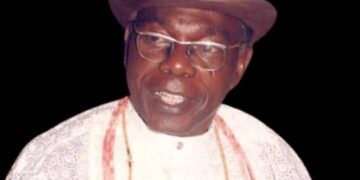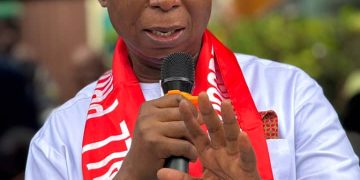1. The Delta State Contributory Health Commission (DSCHC) Bill was signed into law by the Governor of Delta State on the 4th of February 2016.
2. The Bill to establish the Commission was transmitted to the Delta State House of Assembly on the 22nd June 2015 a few months after his assumption of office as Governor of Delta State. The Bill went through a first reading on the 24th June 2015, second reading on the 12th August 2015 as well as a public hearing on the 26th August 2015. The Bill had its third reading and was passed by the Delta State House of Assembly on the 9th December 2015.
3. The Law established The Delta State Contributory Health Commission, The Delta State Contributory Health Scheme and other Matters Connected Thereto as well as a Governing Board for the Commission which will regulate, supervise, implement and ensure an effective administration of a Mandatory Delta State Contributory Health Scheme for all residents of Delta State.
4. Before the commencement of the Scheme, a Baseline Assessment Survey was conducted to: –
i. Determine key household demography and health-seeking behaviour of Deltans to guide planning for an expanded health insurance coverage.
ii. Determine the current household spending on health, health insurance coverage needs and willingness to pay for health insurance in Delta State.
iii. Estimate the proportion of Delta State residents in the lowest socio-economic quintiles, to guide decisions on subsidy and or exemptions from payment.
iv. Assess the availability and capacity of health delivery facilities in Delta State to deliver proposed health insurance services
v. Assess the readiness of health facilities to deliver proposed services across all 25 LGAs.
5. A Board for the Commission was inaugurated to commence the implementation of the Scheme.
6. The Scheme commenced with an operational Head office at No 10 DBS Road Asaba and 25 Liaison Offices at the 25 LGA Headquarters in Delta State.
7. A website was developed for the Commission www.dschc.org.ng.
8. Personnel were deployed and engaged from the State Civil Service System and the State Local Government Service system to work in the various departments of the Commission.
9. A State-wide healthcare service quality improvement initiative was initiated with a visit to all Healthcare facilities across the State. A database of the status of all Public Healthcare facilities in Delta State was developed and submitted as a baseline status report to track healthcare facility improvement activities.
10. The Commission conducted Advocacy meetings with the Delta State House of Assembly, Ministry of Health, Ministry of Economic Planning, Office of Head of Service, State Civil Service Commission, Local Government Service Commission, Hospital Management Board, Primary Healthcare Development Agency, Nigeria Labour Congress, Trade Union Congress, Nigeria Medical Association, Private Healthcare Providers Association, LGA Chairmen, LGA PHC Coordinators, various Formal and Informal Sector Associations and other relevant stakeholders.
11. A Benefit Health Package was determined for the Scheme and an Actuary Assessment of the Benefit Health Package was reviewed by a constituted State Advisory Committee to arrive at the Premium of N7,000 per enrollee per year for the Informal Sector Group and 1.75% of gross salary for the Formal Sector Groups with the employer equivalent contribution on behalf of each employee.
12. The Operational Tools, the Governance Framework and Organizational Structure for the Commission were developed.
13. An Operational Guideline for the implementation of the Law establishing the Commission and Scheme was developed and Gazetted.
14. A Geographical Information System (GIS) Mapping of Public Primary and Secondary Health Facilities in Delta State was done in partnership with NHIS to determine the coordinates for Geolocation of all accredited Government Healthcare facilities.
15. Healthcare service personnel across the 25 LGA’s were trained on the operations of the Scheme and the technology applications required for implementation of the Scheme.
16. In collaboration with the Ministry of Health, commenced the refurbishment, equipping, personnel recruitment and training of healthcare personnel in all the healthcare facilities accredited for the Scheme.
17. Healthcare Service under the Scheme commenced on the 1st of January 2017 in selected Government Healthcare facilities by transitioning the Free Maternal and Free Under 5 Healthcare programs into the Delta State Contributory Health Scheme.

18. The Scheme is now operational in 405 accredited healthcare facilities spread across the State (268 Primary Health Care Centers, 66 Secondary Health care Facilities, 65 Private Health Care Facilities, 1 Federal Medical Center, 3 Abuja Health Care Facilities and 2 Lagos Health Care Facilities) and currently has in its database, 788,740 enrolees comprising 171,123 (Principal and Dependents) members of the Formal Sector Groups whose Premium are paid based on deduction from the worker salary from Payroll and Employers counterpart contribution on behalf of the worker and 5 family members as stipulated in the DSCHC Operational Guideline, 11,456 members of the Informal Sector Groups whose Premium are paid based on N7,000 per enrollee per year as stipulated in the DSCHC Operational Guideline and 606,161 (225,717 Pregnant Women and 380,444 Children Under 5 Years) members of the Equity Health plan Group whose Premium are paid for by the Delta State Government. Current effort is to continue to enhance the Informal Sector enrolee population, especially in rural communities leveraging on the BHCPF program.
19. The Commission established 24 hours Call Center operated by Call Center Operators for enquiries, complaints, feedback and other communication requirements for the Scheme with a Monitoring and Evaluation Team for review assessment of the Scheme’s implementation across the state.
20. To improve on management of Diabetes and Hypertension, the DSCHC representing the Delta State Government signed an MOU with Servier Pharmaceutical of France for a program called the “Hospital Cash Cover Program” that will provide subsidized and discounted Antihypertensive and Diabetics Drugs for all enrollees of the Scheme; Train 200 Medical service delivery personnel in Delta State on the latest treatment protocol in the management of Hypertension and Diabetes; Support the Delta State Government through payment of Premium for an agreed number of Vulnerable people under the Scheme and eventually produce Generic Drugs for use under the Scheme from Servier/SWIPHA manufacturing facility in Nigeria.
21. To ensure a seamless service of the Scheme, the DSCHC representing the Delta State Government signed an MOU with Interswitch and eClat Health to deploy an ICT platform for the Scheme using Interswitch and eClat Health software and infrastructure. This program provides an elaborate online real-time electronic medical records, electronic referral code request, electronic billing and payment systems for an identity and health insurance management solutions that will ensure payment of Premium for the Scheme through several options that include Quickteller, POS, ATM, Cash at bank, and Webpay as well as real-time payment to healthcare providers for services rendered and the management of the Scheme processes. This process enabled the DSCHC to operate seamlessly during the Covid 19 Pandemic Shutdown.
22. The Commission leveraging on the above, has an “Integrated ICT Platform” that enables service information from accredited healthcare facilities to interact directly with the Commissions operations. A total of 215 Primary Healthcare Facilities and 47 Secondary Healthcare Facilities are currently providing and transmitting healthcare service information to the DSCHC electronically. This has helped the Commission manage backlogged Bills as it became a challenge to manually process thousands of bills from over 400 accredited HCFs monthly. Some HCFs have gone completely paperless in their service delivery process. The “Integrated ICT Platform” also enables filed registration data to feed directly to the Commission for enrolee processing and Identity Card production as well as interact with the accredited Healthcare Facilities Electronic Medical Record for Enrolee identification and authentication at Point of Care. The enhancement of the above “Integrated ICT Platform” is currently ongoing with a “Retraining and Handholding” activity across all accredited HCFs with upgrade of the ICT and Solar Power Infrastructure. The Commissions administrative processes has also been computerized with an “Enterprise Resource Planning” (ERP) System, enabling a seamless administrative operation to ensure a consolidated and sustainable health insurance program in Delta State with a Cybersecurity protocol for data protection. A capacity enhancement training for all personnel of the Commission is currently ongoing to meet with the ERP system performance requirement. Training for Heads of all accredited healthcare facilities will commence within the next weeks.
23. The Commission established Enrolee Registration Centres at the DSCHC Head Office at N0 10 DBS Road Asaba and at each of the 25 DSCHC Liaison offices in the 25 LGA headquarters. The Commission also has DSCHC Field Registration Agents (Rural Community Based Registration Agents and Urban Community Based Registration Agents) visiting each community for “House to House” Advocacy to enlighten people and register them into the Scheme as well as an online DSCHC Self Registration App “DSCHC” hosted on Google Play Store to enable from the comfort of an Enrolee home, Self-registration of Biodata, upload of Picture and online payment of Premium. Information from the “DSCHC App” is received at the DSCHC office where after confirmation of payment and Biodata, an identity Card is printed and sent to the enrolee’s registered address via courier to reduce logistics bottlenecks.
24. The Rural Community Based Registration Agents (RCBRAs) conduct “House to House” advocacy and sensitization activities about the Scheme in rural communities, are able to register residents into the Scheme, collect Premium payments online or offline and process identity cards required for enrolee authentication at the point of care. The Urban Community Based Registration Agents (UCBRAs) conduct above activities in urban communities in Delta State. The RCBRAs are mostly indigenes of the rural communities conversant with the language and culture of the rural communities. The UCBRAs are more enlightened with good communication skills to enable interaction with urban dwellers and the Organized Private Sector Organizations.
25. To ensure an equitable spread of healthcare facilities and services to all parts of Delta State especially the very remote rural communities, the Delta State Contributory Health Commission representing the Delta State Government in collaboration with the Ministry of Health, is partnering with the Bank of Industry and the Pharmaccess Foundation for an “Access to Finance” program to revitalise 25 defunct Healthcare facilities in rural communities leveraging on the Private Sector capacity and efficiency of service under the Bank of Industry SME program. The “Access to Finance” program approved by The Governor of Delta State, is designed to facilitate the availability of functional healthcare facilities across the State especially in hard to reach disadvantaged communities in Delta State. 15 are currently operational and notable amongst them are the Polobubo, Oporoza, Ode Itsekiri, Obio, Ogbagu Ogume, and Owo Olomu HCFs.
26. In an effort to further improve on the management of Non- Communicable Diseases, the Delta State Contributory Health Commission representing the Delta State Government is partnering with SANOFI a French Drug manufacturing company to (1) enhance the healthcare service capacity for 400 Healthcare Providers (Doctors, Nurses, Pharmacists and CHEWS). (2) Upgrade of 3 Rural PHCs, to strengthen the management of diabetes and hypertension in rural communities by implementing Diabetes and Hypertension Clinics through provision of medical utility equipment, educational materials and upskilling of PHC medical personnel to improve utilization of the PHCs by Hypertension and Diabetes patients in underserved communities (3) Screening of 10,000 residents to identify undiagnosed people living with diabetes and hypertension in rural communities (4) Provide 50% discount price off Insulin market price by Sanofi to the Delta State Drug Revolving Fund (5) Provide affordable care support (with up to 40% discount price for other SANOFI’s primary and secondary care medicines) through the Delta State Drug Revolving Fund and (6) Engage a Patient Support Program for 2000 PLWD on Sanofi Insulin, through the provision of diagnostic tools e.g glucometers, dedicated patient educators, 12hrs call center for patients, HBA1c check, educational materials and 12 months follow up for each of the 2000 PLWD to improve patient adherence to treatment.
27. During the Covid 19 Pandemic shutdown, the DSCHC was able to continue full operations leveraging on its Integrated ICT Platform. Enrolees of the Scheme continued to have access to healthcare services. The Commission provided logistics support to healthcare facilities Doctors and Nurses to enable them to be at their workplaces. An online healthcare support service was provided to enrolee through dedicated Phone lines and those that needed physical medical support were provided transportation as much as possible. The eClinic Software system comprising eMedical Records, eTreatment Protocol, eReferral Process, eBilling System, ePayment Portal were all active during the period including the Commission 24 Call Center. Following the high Covid 19 infection rate amongst Doctors, Nurses and other healthcare Providers especially with the death of our notable Medical Consultant from the Covid 19, the Commission embarked on an Infectious Disease Prevention and Control Advocacy and Sensitization campaign at all accredited healthcare facilities. High-Quality Facemask most suitable for frontline healthcare providers and InfraRed Thermometers for early patient triage were handed over to each of the healthcare facility. The Commission also used the opportunity to review the status of quality service delivery from an accredited healthcare facility with guidance for a “Patient-Centered” healthcare service delivery to enrollees of the Scheme.
28. The Delta State Contributory Health Scheme has so far won several awards since commencement of the Scheme in 2016. Notable was in 2017 when the Scheme won the Outstanding Healthcare Program of the Year, presented at the Nigerian Healthcare Excellence Award ceremony in recognition of the States outstanding service delivery in the field of healthcare in Nigeria. In 2018, the Scheme won an award as the State with the most people covered under the State Social Health Insurance Scheme with focus on the Poor and Vulnerable population in Nigeria under the World Bank/FG – Save One Million Lives Program, presented by the Vice President of Nigeria Professor Yemi Osibanjo.
29. The Delta State Contributory Health Commission is currently supporting other states in Nigeria through experience and best practice knowledge sharing and capacity enhancement. Several States have so far been sponsored by UNICEF and WHO for a study tour to Delta State to enhance the setting up and up-scaling of their Health Insurance programs to ensure that Nigeria as a country is able to achieve the Universal Health Coverage mandate of “Health for All” in year 2030.
30. The Health Insurance Commission does not handle or get involved with the deductions of workers salary. The deduction is done from the Payroll Office of Head of Service office. We only receive names of those entitled to get service for each month and we send their names to the hospitals that the enrollee has chosen to receive healthcare service. The list sent from the Payroll office does not say if there is husband and wife or how much has been deducted. That’s why “Couple enrollees” will have to write to the Payroll Office to stop the deduction of either of them. The Commission has no control on the process.
31. The enrollees of the Scheme also always choose their hospital and it is the chosen hospitals that is responsible to provide treatment services. The Health Insurance Commission does not get involved or interfere with the clinical treatment service process at any hospital. If an enrollee does not like his or her chosen hospital services, the enrollee is free to change by applying to the Commission for change, indicating the new one they want.
32. The Commission only pays for hospital bills sent by the hospital and that has been authenticated by the enrollee. Enrollees have to sign each billing sheet to confirm treatment as acceptable before the Commission pays and bill payment is made directly to the account of the hospital that has provided the healthcare service.
33. The journey so far has been challenging, interesting and successful. We will continue in our effort towards ensuring every resident of Delta State has access to quality healthcare service without a serious cost consequence of receiving that healthcare service.













